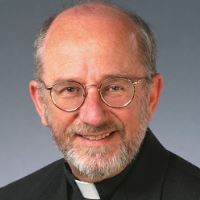Commentary on 1 Timothy 1:12-17
Teaching morality by proposing striking contrasts has long been an effective strategy, as for example in the Jewish Two Ways moral instruction.
This method sets the alternatives clearly before our eyes so we do not get lost in the nuances and blur the differences between the alternatives. It is like the contrast between Moses wearing a veil on his head and the unveiled Christian (2 Corinthians 3:12-18).
And so in 1 Timothy 1:12-17, the passage presents its message in clear and striking contrasts. The letter’s author, whom I refer to as Paul, acknowledges that he acted arrogantly as he persecuted and harassed Christians. Paul’s arrogance grew out of his pharisaic pride in attending to fulfilling the multitudinous requirements of the Law perfectly.
Subsequently Paul came to know his actions as blasphemous and ignorant. Attention to one’s accomplishments in following the way of virtue can easily lead into claiming the success as one’s own accomplishment rather than the working of God’s help in making choices in the direction God wishes for us. It also could easily lead us to think that we are better than those following another path and seemingly falling short of the goal we set for ourselves and them. In all of this we easily lose sight of God’s action in our lives.
Paul also came to realize his defense of the Jewish faith tradition to be acting out of unbelief and ignorance of true faith. Coming to know Christ and the power of Christ’s resurrection (Philippians 3:10) led him to see all that he previously held and vigorously defended as so much rubbish and loss (Philippians 3: 7-8). It is humbling to come to the realization that the truths that we vigorously maintained and the attitudes and actions that followed upon them are erroneous or incomplete. This, however, rather than a defeat can be the start of new growth and the change of heart that our faith requires of us all (Mark 1:15, Acts 2:38).
His merciless persecution was turned around by God’s merciful treatment of him. The foremost defender of Judaism (see also Philippians 3:4-11) realized that he was the foremost sinner in doing that. Paul’s ruthless and arrogant actions were met with, and transformed by, divine mercy. The searing fire of God’s mercy burnt away the dross of error and self-will from Paul’s character and let his fierce adherence to the will of God and advancement of God’s Law serve the gospel. Paul shows the way that our effort to open our inner selves to the purifying action of God can result in a change in which we use our talents to advance God’s purposes.
His self-willed action became transformed by the empowerment that came from Christ and his missionary activity became dedicated service of Jesus Christ. When Jesus confronted him on the road to Damascus demanding to know why Paul was persecuting Christ (in the persons of Jesus’ followers) and when he subsequently received the Spirit at his baptism by Ananias (Acts 9:4-6, 17), the power of the Spirit of God entered him and impelled him on his mission to spread the gospel throughout the Roman Empire. It is this same Spirit that all Jesus’ followers receive at baptism, an empowerment for spreading the gospel message in action and word.
Paul’s blasphemy was really an offense against God. His zeal was an assault on the Christian community. His prideful and arrogant motivation revealed a deep, personal flaw. In the same way, our misdeeds are multidimensional. Their offensiveness to God is a fundamental aspect of them but does not fully characterize them. The social dimension of our sinfulness cannot be overlooked or underestimated. While Paul directly persecuted the Christian community, our own sinfulness is damaging even if this is not readily apparent. In the first place, the toleration of evil in ourselves deadens us to its reality in the community as a whole and might even lead to expressions of toleration of similar sinfulness in others through a perverse effort of self-justification. Such toleration also contributes to the prevailing view that things we say and do are all right as long as they don’t hurt others. In reality, all sin diminishes the holiness of all in the body of Christ and contributes to the atmosphere of a tepid faith that gives the lie to our pretensions of being followers of Christ whether as individuals or as a community.
The mercy of God was revealed to Paul in its transforming forgiveness. The mercy of God, rather than accuse Paul outright, showed him that he was acting out of an ignorant lack of faith. But now he knows the truth and declares it, namely that Jesus Christ came into the world to save sinners. The forgiveness of God does not rest on a blanket condemnation and rejection of us but, like our own efforts at restorative justice, seeks to build on the good that stands alongside and is eclipsed by our evildoing.
In the end we are all creatures loved and sustained by God, who always seeks what is best for us here and hereafter. Jesus’ death on the cross for us is the ultimate demonstration of this patient and forgiving love. As part of our repentant change of heart, we ought never overlook the good in us that God sees and draws out of us into consciousness and action.
Jesus’ divinity is suggested by the title Lord and by a recognition that he came into the world (see also Philippians 2:5 -11). Thus he brought power along with forgiveness. The power echoes 1 Corinthians 12:4-11 in its discussion of the charismatic gifts for the believers. The power or gift has the purpose of service of the gospel here. Again this echoes 1 Corinthians 12:7 “for the common good.” The passage ends with praise of the almighty and unseen God whose plan Jesus the intermediary (see 1 Timothy 2:5) brought to fulfillment.


September 15, 2019